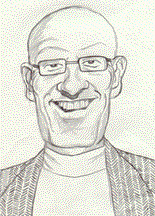Michel Foucault

Long after the cults of other 20th century French thinkers have faded here in the U.S., American academics still seem to love Michel Foucault, who was born on this day 79 years ago in Poitiers, France. Going out on a limb here, I'll guess that this has something to do with the fact that the historical, public ebb and flow of our Democratic institutions has given us a well-developed sense of injustice -- that, and we do love our conspiracy theories here. Although Foucault himself doesn't necessarily focus on such matters, his arsenal of critical weapons and predilection for piss-taking certainly have allowed us Americans to beat injustices and conspiracies with a stick.
A brilliant youth, Foucault entered the highly prestigious Ecole Normal Superieure in 1946 at a time when official France still required his homosexuality to be hidden from broad daylight. In the pressure-cooked environment of the ENS, Foucault developed an armor of argumentativeness, intellectual superiority and scorn for those who earnestly played by the rules, coupled with an obsession with suicide resulting in an unsuccessful attempt to kill himself in 1948.
Although he read philosophy voraciously, particularly Heidegger and Nietzsche, and studied under Maurice Merleau-Ponty, Georges Canguilhem and Louis Althusser, he supplemented his education by immersing himself in psychology. After graduating in 1952, he taught at Lille and Uppsala and worked in a psychiatric hospital before publishing his first work, Madness and Civilization: A History of Insanity in the Age of Reason (1961), in which he argued that the notion of "insanity" was a discursive tool used by authorities to categorize acceptable and unacceptable behavior (rather than an illness), and that insane asylums were depositories for excluding nonconformists (rather than treatment facilities).
In this first book, he established some themes that would dominate his subsequent work: writing beyond the genre of "philosophy," Foucault wrote about the history of thought, science, society and institutions with highly personal doses of irony, cynicism and wit (remnants, no doubt, from his old ENS suit of armor) to supplement his philosophic seriousness and skepticism, exploring the ways in which those who are in power cultivate distinctions within society -- dividing and conquering in the process -- and therein hide the mechanisms of their self-preservation.
His books The Birth of the Clinic: An Archaeology of Medical Perception (1963) and Discipline and Punish: The Birth of the Prison (1975) discussed the rationalization of practices which were ultimately used to control subjects within the domains of the physician and the state, respectively; and The Order of Things (1966) and The Archaeology of Knowledge (1969) examined the embeddedness of "organization" or "order" as a component of social knowledge and self-identification, and the limits of revolution as an effective device for change in the face of such organization.
Finally, his unfinished History of Sexuality (1978-87) revealed some of the aims of his later work, that he was less interested in articulating a theory of power than in providing opportunities for reexamining the "self," taking Nietzche's destruction of cause-and-effect and the notion of phenomena not having any intrinsic meaning as points of departure for crashing through the web of social relations which constitute the "self."
Foucault was often grouped with the Structuralists, such as Claude Levi-Strauss, because his arguments were based on the view that the world is only intelligible to humans because of the order they impose upon experiences. Although he personally campaigned for the same causes as the Marxist radicals (prison reform, gay rights, the student uprisings of 1968), he rejected Marxism for its strident scientific strains. In fact, he stubbornly refused to attach himself to "movements," as "movements" for him were themselves rationalized regimes for perhaps casting himself as intellectual victim.
Foucault, who died of AIDS-related complications on June 25, 1984, concealed the nature of his illness at the end (some would say, as a way of dismissing the relevance of biographical facts), and ironically died in the same hospital, once an insane asylum, that he had researched for Madness and Civilization.
Labels: Marxism, Philosophy, Psychology





1 Comments:
I've made my peace with Foucault, but I refuse to believe that the academic sun shines out of his arse. (That's a big statement for a grad student these days.)
This is a quality blog- thanks for letting me know about it.
Post a Comment
Subscribe to Post Comments [Atom]
<< Home